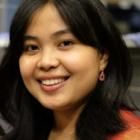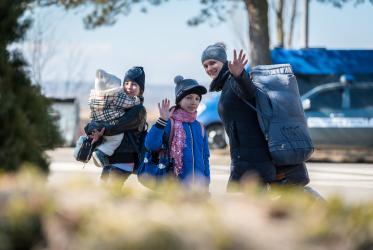In his sermon during Morning Prayer at the Bossey Chapel on 22 November, Rev. Dr Martin Robra noted that being on the move is in our DNA as Christians: we are pilgrims on earth.
Reflecting on Matthew 2:13-15, he further observed that the situation of baby Jesus and his parents fleeing to Egypt was similar to what is being experienced by helpless children in many parts of the world today. Many vulnerable children are in danger. Martin’s message came a day after the Children’s Day celebration at WCC headquarters in Geneva jointly hosted by the WCC and UNICEF at the Ecumenical Centre.
Being a refugee
It is discouraging to see people flee because of war and persecution, and it is even more disheartening that children—the most vulnerable—are part of that terrible experience. During the Children’s Day celebration, Sanoussy, a young boy, shared his experience of being a refugee. When his father was arrested few years ago back in his home country, life left him only two options: join the rebels or run away. When he eventually arrived in Switzerland in 2012, he had terrible ordeals. He said that, being a refugee, he had lost his notion as a person because people see him only as a refugee.
He sojourned from one place to another until he finally settled in Canton de Vaud where he was received by the Protestant Church. The Protestant pastor, Rev. Antoinette, and the congregation in Vaud embraced and and encouraged him. The church supports a programme in which families host children, share meals regularly, and mentor them in transition to adulthood, all the while allowing them to experience family life even though they are separated from their families.
Since this programme began, more than 100 children have been hosted by families. After his encounter with this community, Sanoussy said he feels valued as a person, and that people listen to him and appreciate his ideas.
Hosting a stranger
Coline, a 17-year-old Swiss girl, shared her experience, too. After reading an article about the support programme for unaccompanied minors, she said she tried to imagine if her younger brother and her were in the another country and some people took care of them. Coline and her brother tried to put themselves in another person’s shoes. Coline’s family hosted a boy who smiled and was very friendly in the beginning, even though he was very worried when he first met them. He usually visits them once a week. Coline’s mother was the entry point for him into the family because he usually speaks with her. Coline then became like a sister to him. At the beginning, Coline was worried that the boy would not be able to fit into their family. But as after some time, they felt he was not a guest anymore.
Little things lead up to big things! Those are the words of 21-year-old Kiran Oommen, who is part of a group that is suing the US government for its role in causing climate change. Twenty-one courageous youth ranging in age from 10 to 21 filed a lawsuit now famously called “Juliana v United States.”
Kiran said that, as youth being affected by climate change, they need a recovery plan as a community. He urged people to take into their hands the things that they can do as they learn from Jesus. He reflected that Jesus does not only speak, but also does what he teaches.
Anouk Walliser Keel (aged: 13 years old) from Oeku Church and Environment, pointed out that “alone you can achieve something but its better if you can work together.” She recalled her experience as 9 year old kid doing fundrising for WWF. At that time she thought that she has contributed so much to the world. As she grew up she realized that she achieved something as individual on small scale. For big one, we need big organisation and we need the church as a connecting link.
Find out more:





